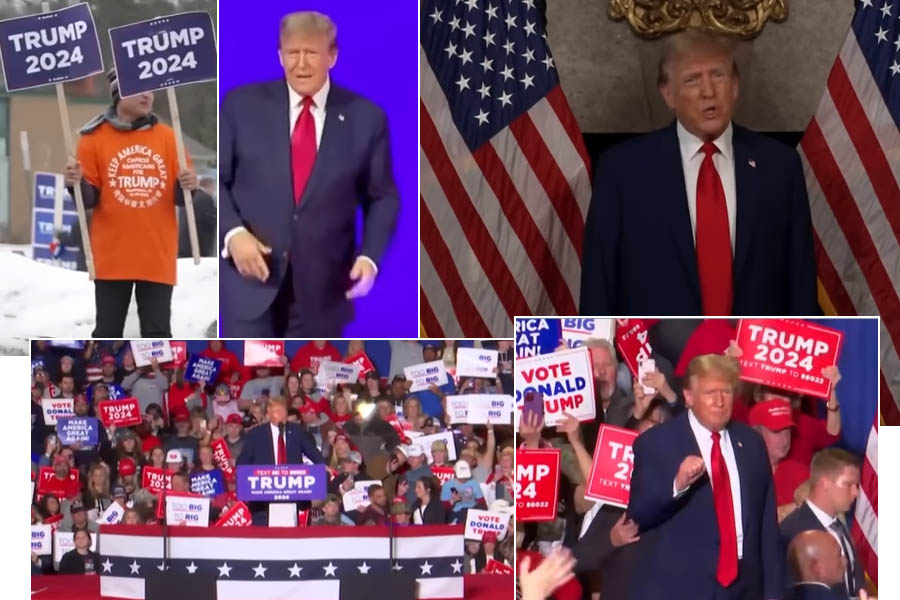
In a significant ruling, the United States Supreme Court has unanimously decided that former President Donald Trump can stand as a Republican presidential candidate in Colorado. This decision comes after the state's Supreme Court initially barred him from the ballot, citing allegations that he incited the infamous Capitol riot on January 6, 2021. The ruling, which deemed the state's actions unlawful, highlights a critical aspect of the balance of power between states and the federal government in matters concerning presidential candidacy.
The controversy surrounding Trump's eligibility to run for office in Colorado arose when the state, among others, attempted to exclude him from primary elections. The argument put forth by Colorado officials rested on the claim that Trump's alleged role in inciting the Capitol riot disqualified him from holding national office under a constitutional provision intended to prevent insurrectionists from assuming such positions. However, the Supreme Court's decision clarified that only Congress possesses the authority to enforce such provisions concerning federal offices, effectively overturning the state's decision.
This ruling holds significant implications not only for Trump's candidacy but also for the broader understanding of states' powers in regulating presidential elections. By asserting that individual states lack the authority to bar candidates from federal office based on insurrection allegations, the Supreme Court reaffirms the supremacy of federal law in matters of national governance.
Trump's eligibility to run for president in Colorado, a pivotal swing state, has been a subject of intense scrutiny, particularly in light of his overwhelming popularity among Republican voters. As the frontrunner for the Republican nomination, Trump's potential candidacy in the upcoming presidential election looms large, setting the stage for a high-stakes electoral showdown against Democratic incumbent President Joe Biden.
The Supreme Court's decision comes amidst a backdrop of legal challenges and controversies surrounding Trump's post-presidential activities. Despite facing ongoing criminal trials and legal battles, including charges related to hush money payments and the retention of classified documents, Trump's political aspirations remain undeterred. His ability to mobilize support among his base, fueled in part by the politicization of his legal troubles, underscores the complexities of his candidacy and its broader implications for the American political landscape.
While the Supreme Court's ruling represents a significant victory for Trump, it does not necessarily signal the end of his legal woes. The former president still faces a series of legal challenges that could potentially impact his candidacy and future political prospects. However, with the nomination for the Republican candidacy seemingly within his grasp, Trump's focus may shift towards navigating the electoral landscape and securing victory in the upcoming presidential race.
As the nation braces for a contentious election season, characterized by polarization and political turmoil, Trump's reemergence onto the political stage promises to reignite debates surrounding accountability, governance, and the rule of law. With the Supreme Court's decision serving as a pivotal moment in his political journey, Trump's bid for the presidency continues to captivate the American public, shaping the trajectory of the nation's democratic process in the months to come.
Message To The Readers:
Supreme Court Ruling: The United States Supreme Court has unanimously ruled that former President Donald Trump can stand as a Republican presidential candidate in Colorado, overturning the state's decision to bar him from the ballot due to allegations of inciting the Capitol riot.
Federal vs. State Authority: The ruling clarifies the balance of power between states and the federal government in matters concerning presidential candidacy, affirming that only Congress possesses the authority to enforce provisions regarding federal office eligibility, not individual states.
Implications for Trump's Candidacy: Trump's eligibility to run for president in Colorado, a key swing state, underscores his popularity among Republican voters and sets the stage for a potential showdown against Democratic incumbent President Joe Biden in the upcoming presidential election.
Legal Challenges and Political Landscape: Despite facing ongoing legal battles and controversies, including criminal trials related to hush money payments and classified document retention, Trump's political aspirations remain undeterred, with his focus shifting towards navigating the electoral landscape and securing victory in the presidential race.
Thank you for reading: globalpostheadline.com | If you want to advertise your Company, Events, Movies, Products, Hotels, Travel Packages Let us know